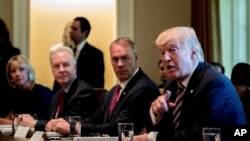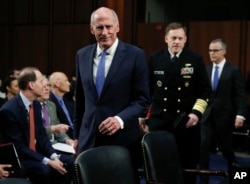The special counsel investigating Russia's influence on last year's U.S. elections and possible links to the campaign of President Donald Trump has expanded to include looking at whether the president has obstructed justice.
The revelation came late Wednesday in articles published by the Washington Post, New York Times and Wall Street Journal, based on accounts of people familiar with the investigation.
The newspapers said special counsel Robert Mueller plans to interview Director of National Intelligence Dan Coats, National Security Agency Director Michael Rogers and former NSA Deputy Director Richard Ledgett.
NSA deputy director's memo details Trump call
According to the Post and Wall Street Journal reports, Ledgett wrote a memo describing a phone call Trump made to Coats in which the president asked Coats to publicly say his campaign did not collude with Russia.
The Post further said Trump made a similar request in a phone call to Rogers.
Mark Corallo, a spokesman for Trump's personal attorney said, "The FBI leak of information regarding the president is outrageous, inexcusable and illegal."
The chairwoman of the Republican National Committee, Ronna McDaniel, criticized the Post story as an "unfounded accusation."
"There's still no evidence of obstruction, and current and former leaders in the intelligence community have repeatedly said there's been no effort to impede the investigation in any way," she said in a statement.
Comey's firing leads to Special Counsel appointment
In May, Trump fired Federal Bureau of Investigation Director James Comey, saying "this Russia thing" was on his mind when he made the decision to oust the nation's top law enforcement official while Comey was leading the FBI's probe into Russia's meddling.
About a week later, Mueller was appointed as special counsel to lead his own probe.
Comey testified before a Senate panel last week that Trump spoke privately with him several times, including by telephone and at a meeting in Trump's office in the White House.
Comey said he believed Trump was trying to get him to drop an investigation of the president's former national security adviser, and that White House officials spread "lies, plain and simple" to cover up the reason for his dismissal.
"I know that I was fired because something about the way I was conducting the Russia investigation was putting pressure" on Trump, Comey testified.
The president's personal lawyer, Marc Kasowitz, told reporters immediately after the Senate hearing that Trump "never, in form or substance, directed or suggested that Mr. Comey stop investigating anyone."







